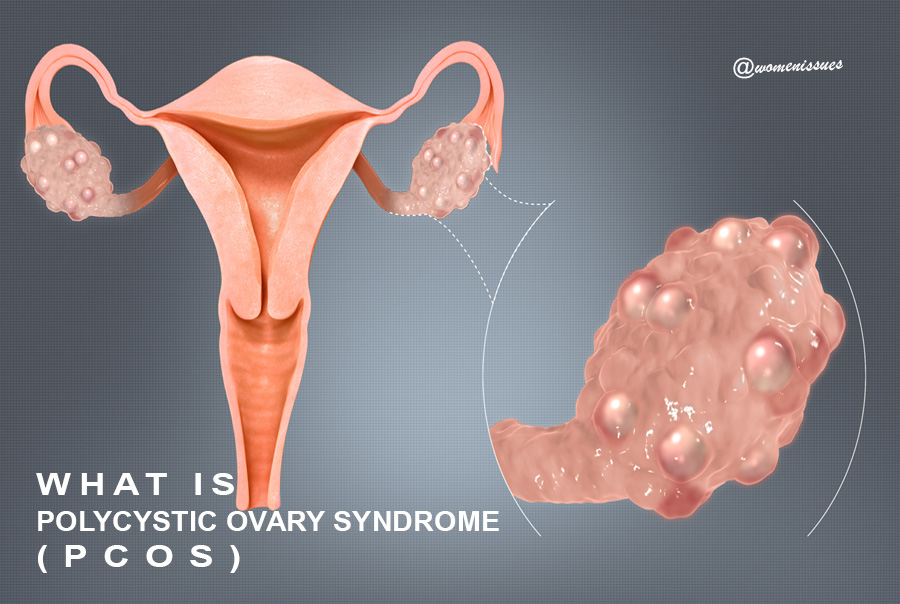WHAT IS PCOS?
PCOS is an imbalance of reproductive hormones. This imbalance creates issues in the ovaries, the ovaries make the egg that is released every month for our menstrual cycle. When you have PCOS, it simply means that the egg may not be released during ovulation or even develop as it should. The inability of the egg to be developed or released can cause some irregularities. PCOS affects most women during their childbearing years.
The word polycystic mean many cysts, many small fluid-filled sacs known as follicles that grow in the ovaries.
WHAT CAUSES PCOS?
There is no well-known reason behind it but high levels of male hormones present in a woman and insulin contribute to the condition. Note that cysts are only a sign of PCOS, not the cause.
HIGH LEVELS OF ANDROGEN
Did you know that women also have testosterone? ooh yes, they do. Ovaries produce both testosterone(male hormone) and oestrogen. Women have a lower amount of this male hormone naturally. A small amount of testosterone called androgen is released into a woman’s bloodstream by the ovaries and adrenal glands. PCOS is then caused when the androgen level is higher than normal. These abnormal androgen levels will prevent the ovaries from releasing an egg during the menstrual cycle or ovulation.
HIGH LEVELS OF INSULIN
Another risk factor is high insulin levels, insulin is regarded as the underlying driver of PCOS. Insulin is a hormone that converts sugar from our blood into energy. An excess of insulin may lead to an increase in androgen production. Most women with PCOS have insulin resistance particularly those with a family history. Being overweight is another major cause of insulin resistance, there is a risk of type 2 diabetes if you are both insulin resistant and obese. Lack of physical activity and having unhealthy eating habits are among the risk factors for insulin resistance followed by PCOS.
WHAT ARE THE COMMON SYMPTOMS OF PCOS?
. Irregular or missed menstrual cycle
. Inability to get pregnant(infertility)
. Cysts developing in the ovaries
. Skin darkening underneath breasts, neck creases, and the groin
. Skin tags in the armpits or neck area
. Acne on the face, chest and upper back
. Baldness in a male pattern or hair thinning
. Too much hair where men usually have hair like beards on the face and chin or any part of the body where men grow hair
. Some women get headaches
. Pelvic pain
OTHER RISKS INVOLVED
If PCOS is not managed, it can increase the risks of other issues like;
heart diseases
metabolic syndrome
stroke
depression
sleep apnea
endometrial cancer and
diabetes
HOW IS PCOS DIAGNOSED?
When you have an irregular menstrual cycle, cysts in the ovaries and high level of the male hormone. Your doctor may further ask you about any other signs and symptoms you are experiencing. N.B not all women with ovarian cysts have PCOS and not all women with PCOS have polycystic ovaries. Hypothyroidism can also cause an irregular menstrual cycle.
. A blood test can be done to check for levels of male hormone
. A pelvic exam can be done to check your ovaries or an ultrasound can be used.
CAN I STILL GET PREGNANT WITH PCOS?
A fair and valid question for any woman who wants to have kids. It is a concern since it interferes with ovulation. PCOS is one of the most common causes of infertility in women but is also treatable so you can still get pregnant. PCOS puts you at a higher risk of miscarriage, gestational diabetes, and high blood pressure. The use of fertility treatments can help improve ovulation.
TREATMENT OPTIONS
PCOS has no cure but it can be controlled by;
Lifestyle change
Medication
Oral contraceptives
PCOS LIFESTYLE TIPS
. Stay active- do physical activity or exercise
. Lose weight- if you are overweight or you struggle with obesity try hard to lose at least 10% of your body weight
. Eat low carbs.
. keep insulin low
FACTS ABOUT PCOS
. Up to 80% of women diagnosed with it suffer from infertility and obesity
. Most women with PCOS have insulin resistance
. PCOS makes it difficult to fall pregnant as it causes an irregular and/or no ovulation.
. It is not the only cause of infertility
**THEY CALL IT Polycystic Ovary Syndrome, LET US SEE IT AS Potential, Capability and Opportunity to Succeed**


No Comment